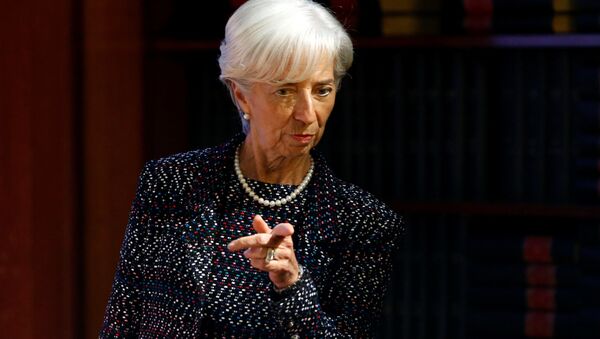In an interview with European media, Lagarde made clear the IMF will not participate in the financing of Greece's staggering €86 billion (US$92 billion) bailout program, which services the country's debt (currently 178 percent of GDP), if Athens does not commit to further reforms, and the European Union fails to provide specific details in respect of debt relief.
Her statements follow a provisional agreement reached between Greece and its European creditors, which would see the country "reform" its pension and tax regimes, in return for receiving the next instalment of the bailout fund. Greece is due to repay €7 billion (US$7.5 billion) of its debt in July.
#IMF's estimate of #Greece primary budget surpluses:
— Yannis Koutsomitis (@YanniKouts) April 19, 2017
2016: 3.3%/GDP
2017: 1.8%
2018: 2%
2019 to 2022: 1.5%#FiscalMonitor #IMFMeetings
Nonetheless, Lagarde's hawkish tone softened somewhat when discussing Greece's obligations in other areas, suggesting the primary budget surplus of 3.5 percent imposed by the EU and much-favored by Germany, was unrealistic, and the country should instead aim for a 1.5 percent of GDP surplus.
"If the Europeans deem differently, then we need to take this into account. But we cannot adopt unreasonable predictions or build upon unjustified macroeconomic frameworks. Restructuring will be needed [but] we are getting close… our team will return to Greece to negotiate in order to have a binding agreement among all sides," Christine Lagarde stressed.
IMF insists higher primary surplus in Greece is due to temporary factors, sees 1.5% as an appropriate target over the medium to long term
— Katerina Sokou (@KaterinaSokou) April 19, 2017
In Athens, ministerial eyes will be glued to the country's primary surplus figures for 2016, due to be officially announced by Greek statistics agency Elstat, April 21, and validated by Eurostat April 24. There are suggestions it will exceed 3.5 percent of GDP, creating a positive carry over for 2017 and potentially beyond, and perhaps affording the country a positive negotiating position, from which to argue for less stringent repayment terms. If economic figures are positive, it will mark the first time in eight years — in which period the country's output declined by 25 percent, and almost a quarter of Greek workers were made unemployed.
IMF projects Greek debt to GDP ratio at 180.7% in 2017, at 181.5% in 2018, at 174.3% in 2019 and at 162.8% in 2022. #Greece #economy #IMF
— MacroPolis (@MacroPolis_gr) April 19, 2017
Given Lagarde's sentiments, it's likely Greek requests for softer conditions will find a receptive audience at IMF head office, although the organization's willingness may not be welcome to Berlin. As Germany creeps ever-closer to its federal election, ministers in Angela Merkel's Christian Democratic Union, particularly Finance Minister Wolfgang Schauble, have renewed their strict stance on Greek repayment, dismissing calls for relief and insisting on yet more austerity.
In February, Dr. Michael G. Arghyrou, a reader in economics at Cardiff Business School, suggested there would be no proper resolution on the Greek debt question until elections in Europe were over.
"With any luck, there won't be a political earthquake that sees a return to the events of 2015, when Greece was nearly pushed out of the Eurozone. Greece needs a credible way forward — unrealistic and unhelpful fiscal targets must be challenged, uncertainty on both sides about Greece remaining in the single currency needs to be resolved, and the debt burden must be reduced," Dr. Arghyrou previously told Sputnik.
With 60 percent of Europe by GDP scheduled to hold elections this year, and populist politicians making much political capital out of Greece's prolonged economic strife, the triangular struggle between Greece, the European Union and IMF, which has raged since late 2009, could be set to thunder far beyond the end of 2017.



